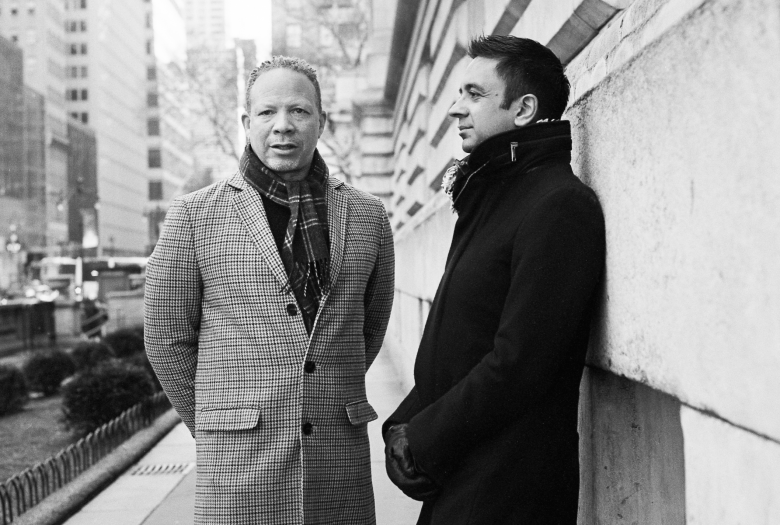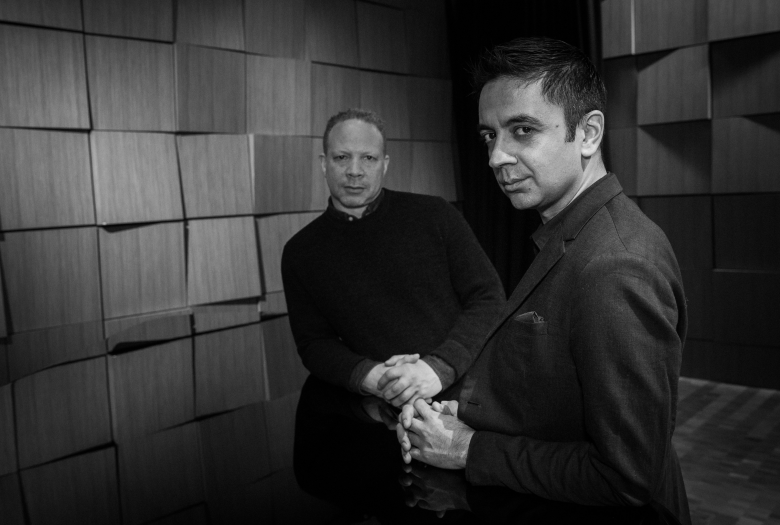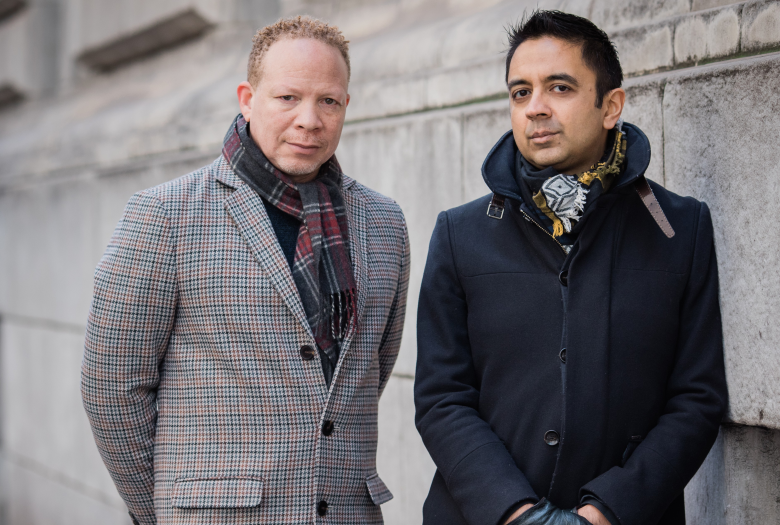The Transitory Poems, recorded live in the concert hall of the Franz List Academy of Music in Budapest in March 2018, is the first release from the duo of Vijay Iyer and Craig Taborn, two of the most distinctive contemporary improvisers. Each a bandleader in his own right, these highly creative pianists have considerable shared history. They began playing together inside Roscoe Mitchell’s Note Factory in 2002. In Mitchell’s group, Taborn and Iyer were called upon to address complex notated material and to deal, concurrently, with the challenges of instant composing and spontaneous arrangement via collective and individual improvisation. “Our duo formed in the crucible of that band,” Vijay and Craig remark in a performers’ note here, “in pursuit of music unique to its moment of creation.” This has remained the quest throughout their subsequent duo work, shaping music in real time, the project evolving from concert to concert. “Something was born for me in the context of working with Roscoe,” Iyer has said, alluding to “a certain quality of listening: how to navigate, how to give way to each other, how to build together…”
Constructive collaboration informs the duo’s music. As Craig Taborn has explained, “part of my practice with improvising is to fully dive in. I become the audience, listening to events and sounds and agency. Whether I’m playing something or not is the first thing I let go of: then I can encounter what is happening.” The musical environment is scanned, details embellished, structures shored up, densities measured, rhythms dovetailed, melodic lines given space to emerge and coalesce. The music is in movement in the fleeting world of The Transitory Poems, transforming and mutating from moment to moment. At times it may acknowledge the vast history of music for two pianos although, as Craig has also pointed out, he and Vijay are “both composers and improvisers and orchestrational pianists – so the question of instrument is just a fact of the context, and not the primary challenge.”
Listening back to their recording, the players heard it as “a series of homages” to great artists who had profoundly influenced them, artists who had recently passed away. “Luminous Brew” is dedicated to Cecil Taylor, the pianist whose music, in its intensity, polyrhythmic complexity and sound organization, remains a vital reference for a generation of musicians. The Iyer/Taborn album title derives from a Taylor interview, in which humanity and its endeavors are considered ‘transitory poems’, unfolding against a backdrop of the mountains that are here to stay.
“Clear Monolith” is for Muhal Richard Abrams, the visionary pianist, composer and improviser, who lit the paths of the early AACM and opened unexplored routes for the music. The painter and sculptor Jack Whitten, dedicatee of “Sensorium”, described himself – in his log Notes from the Woodshed – as “a quantum expressionist”. Whitten derived much inspiration for his work from jazz, and spoke of translating Coltrane’s sheets of sound into sheets of light.
The final track is dedicated to Geri Allen and hints of her theme “When Kabuya Dances” emerge gradually through the improvisation that is “Meshwork”, before the Allen composition, a modern classic, comes to the fore.
The New York Times has suggested that “there’s probably no frame wide enough to encompass the creative output of Vijay Iyer.” Each of his ECM releases has highlighted another aspect of wide-ranging work. Mutations, with Iyer’s compositions for piano, string quartet and electronics was recorded in 2013 and described by The Guardian as “thoughtful, typically original and very exciting.” It was followed by Radhe Radhe, Rites of Holi a collaboration with director Prashant Bhargava, which DownBeat called “his most challenging and impressive work, the scintillating score to a compelling film.” Break Stuff featured Iyer’s popular trio with Stephan Crump and Marcus Gilmore (“a smashing success” – JazzTimes). A cosmic rhythm with each stroke brought Iyer together with his “hero, friend and teacher” Wadada Leo Smith to play “unique music outside all the categories” (Die Weltwoche), inspired by the art of Nasreen Mohamedi. Far From Over, with the Vijay Iyer Sextet, with Graham Haynes, Steve Lehman, Mark Shim, Stephan Crump and Tyshawn Sorey, was showered with accolades. “If you’re looking for the shape of jazz to come, here it is”, wrote Rolling Stone. Far From Over was voted #1 album in the NPR Critics Poll, with the Iyer Sextet also the band of the year and Vijay musician of the year in the DownBeat Critics Poll 2018.
Craig Taborn’s Avenging Angel, recorded 2010, set some new directions for solo piano music. (“As exhilarating as it is serene, and as evocatively melodic as it is unsettlingly recondite, it’s a masterpiece of invention” – All About Jazz). Chants, recorded 2012, brought to a conclusion the group music Taborn had been developing over an eight-year period with drummer Gerald Cleaver and bassist Thomas Morgan. “The songs on ‘Chants’, are positively shimmering, immaculately detailed, prismatic and very improvisational,” noted DownBeat. Daylight Ghosts introduced a new quartet with some old friends – Dave King, Chris Speed and Chris Lightcap – again to rave reviews. This was the sound, Jazziz opined, “of an already great musician cementing his place in the upper ranks of contemporary pianists and composers.”
Vijay Iyer and Craig Taborn first recorded together on Roscoe Mitchell’s Song for My Sister (Pi) in 2002, with their first shared ECM credit being the Mitchell album Far Side (2007), recently reprised in the box set The Art Ensemble of Chicago and Associated Ensembles. Taborn’s ECM debut was also with Roscoe, on 1997’s Nine to Get Ready. Craig appears furthermore on two albums with the Mitchell and Evan Parker-led Transatlantic Art Ensemble – Composition/Improvisation Nos. 1, 2 & 3 and Boustrophedon – as well as with Mitchell’s assembled trios on Bells for the South Side. Other Taborn appearances on ECM include Michael Formanek’s The Rub and Spare Change and Small Places, Chris Potter’s Imaginary Cities and The Sirens, Ches Smith’s The Bell and David Torn’s Prezens.
The independent record label ECM—Edition of Contemporary Music—was founded by producer Manfred Eicher in Munich in 1969, and to date has issued more than 1500 albums spanning many idioms. Emphasising improvisation from the outset, ECM established its reputation with standard-setting recordings by Keith Jarrett, Paul Bley, Jan Garbarek, Chick Corea, Gary Burton, the Art Ensemble of Chicago and many more and began to include contemporary composition—including Steve Reich’s Music for 18 Musicians and Meredith Monk Dolmen Music—in its programme in the late 1970s and early 80s.



